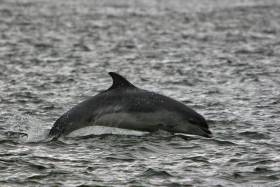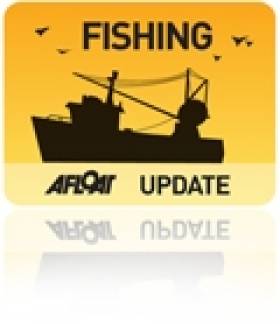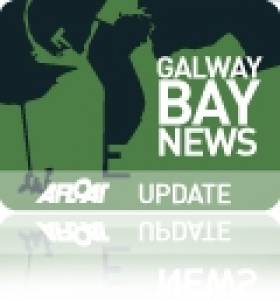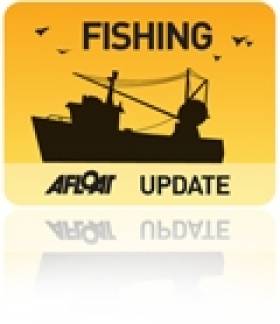Displaying items by tag: Friends of the Irish Environment
Kerry Gas Terminal Plan Faces Legal Challenge Over Dolphin Habitat & Changes In Climate Law
#CoastalNotes - Extension of planning permission for a €500 million gas terminal at Ballylongford on the Kerry coast now faces judicial review, as Green News reports.
Friends of the Irish Evironment (FiE) was granted leave in the High Court to review An Bord Pleanála’s decision to extend permission originally granted in 2008, on the basis that relevant climate law has changed in recent years.
FiE also contends that the environmental assessment submitted with the original application does not take into account a later survey of the area by the National Parks and Wildlife Service.
This 2012 survey identified the earmarked site for the terminal’s jetty as a “critical habitat” for bottlenose dolphins.
Green News has much more on the story HERE.
#FishFarm - Bord Iascaigh Mhara (BIM) has responded to concerns from environmental groups that an ingredient in treatments for sea lice in salmon farms poses a threat to wild marine life.
As Galway Bay FM reports, campaigners Galway Bay Against Salmon Cages - one of the groups opposed to the planned Galway Bay fish farm - say that cypermethrin, an active ingredient in veterinary medicine used to treat sea lice, is toxic to aquatic organisms.
BIM aquaculture manager Donal Maguire attempted to play down fears over the use of the pesticide, saying it has been fully tested for toxicology in the marine environment.
However, another campaign group claims BIM's position is contrary to the manufacturer's own warnings on the use of the drug.
According to FishNews.eu, Friends of the Irish Environment (FIE) cited the Irish Medicines Board's product description for cypermethrin, which states that it is "dangerous to fish and other aquatic life" and demands that the chemical "should not be allowed to contaminate water".
FIE went on to describe cypermethrin as "a biocide which kills life, not a medicine that saves lives" and as "a highly active neurotoxin" with "known effects on fish and, most sensitive of all, crustaceans such as crabs and lobsters. Bathers and watersports [enthusiasts] may also be at risk."
Earlier this month, Inland Fisheries Ireland (IFI) expressed "serious concerns" over the findings of a study on wild salmon in Ireland that claimed fish farm schemes were less harmful to wild fish than pollution and possibly even beneficial to wild catchments.
IFI is among the significant opposition to BIM's proposed organic salmon farm off the Aran Islands, a 500-hectare project that would be the largest of its kind in Europe and create hundreds of jobs in the locality.
Campaigners In Dispute with BIM Over Galway Bay Fish Farm Report
#GALWAY FISH FARM - Environmental campaigners have retracted their accusation that Bord Iascaigh Mhara (BIM) suppressed a report critical of the proposed deep-sea fish farm in Galway Bay.
The Galway Independent reports on a statement released by lobby group Friends of the Irish Environment, which claimed that BIM tried to hide the study by not posting it on its website along with other materials made available for the public consultation period.
The report in question was commissioned by Inland Fisheries Ireland and is critical of the Environmental Impact Statements carried out on the proposed location for the 15,000-tonne organic salmon farm off the Aran Islands.
As previously reported on Afloat.ie, the salmon farm would be located on a 500-hectare site off Inis Oírr, and would be one of the largest of its kind in Europe, projected to be worth €103 million annually for the economy. The scheme has faced opposition from local anglers who fear it could have a negative impact on wild salmon numbers.
BIM strongly denied any wrongdoing, and the lobby group subsequently retracted its allegations upon learning that the IFI report had missed the deadline for submissions for the consultation.
“BIM certainly did not suppress or ignore or gloss over anything from IFI, because we never received anything," said a BIM spokesperson.
However, Friends of the Irish Environment now alleges that the IFI report was late due to a delay in their receipt of the Environmental Impact Statement from BIM.
The Galway Independent has more on the story HERE.
Bass Fishing Permit Refusal is Welcomed
Environmentalists have welcomed the decision by the Minister for the Marine to refuse a permit for commercial sea bass fishing in the Celtic Sea, The Irish Times reports.
The Friends of the Irish Environment hailed Minister Simon Coveney's retention of the total ban on commercial exploitation of sea bass stocks.
Anglers are only permitted to keep two of such fish measuring more than 40cm in any 24-hour period.
There has been much opposition to the proposal by the Federation of Irish Fishermen to lift the ban on commerical bass fishing.
The species has been on the protected list for more than 20 years but this protection was only made permanent in 2006.



























































